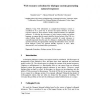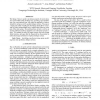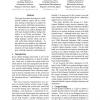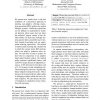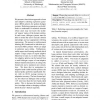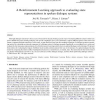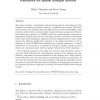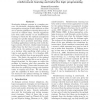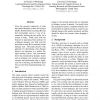130
click to vote
HCI
2011
14 years 5 months ago
2011
Using Web information in example-based dialogue systems is considered to be a good way to increase the topical relevance of system responses. However, Web content is mostly written...
ICASSP
2011
IEEE
14 years 5 months ago
2011
IEEE
The taking of turns to speak is an intrinsic property of conversation. It is expected that models of taking turns, providing a prior distribution over conversational form, can red...
103
click to vote
SIGDIAL
2010
14 years 12 months ago
2010
This paper describes the design of a backchannel feedback corpus and its evaluation, aiming at realizing in-car spoken dialogue systems with high responsiveness. We constructed ou...
142
click to vote
SIGDIAL
2010
14 years 12 months ago
2010
We present new results from a real-user evaluation of a data-driven approach to learning user-adaptive referring expression generation (REG) policies for spoken dialogue systems. ...
135
click to vote
ACL
2010
15 years 4 days ago
2010
We present a data-driven approach to learn user-adaptive referring expression generation (REG) policies for spoken dialogue systems. Referring expressions can be difficult to unde...
127
click to vote
SPEECH
2008
15 years 2 months ago
2008
Although dialogue systems have been an area of research for decades, finding accurate ways of evaluating different systems is still a very active subfield since many leading metho...
119
click to vote
CSL
2010
Springer
2010
Springer
The Hidden Information State model: A practical framework for POMDP-based spoken dialogue management
15 years 2 months ago
This paper explains how Partially Observable Markov Decision Processes (POMDPs) can provide a principled mathematical framework for modelling the inherent uncertainty in spoken di...
138
click to vote
CSL
2010
Springer
15 years 2 months ago
2010
Springer
This paper describes a statistically motivated framework for performing real-time dialogue state updates and policy learning in a spoken dialogue system. The framework is based on...
124
click to vote
NAACL
2001
15 years 3 months ago
2001
Developing dialogue systems is a complex process. In particular, designing efficient dialogue management strategies is often difficult as there are no precise guidelines to develo...
135
click to vote
EACL
2006
ACL Anthology
15 years 3 months ago
2006
ACL Anthology
Given the growing complexity of tasks that spoken dialogue systems are trying to handle, Reinforcement Learning (RL) has been increasingly used as a way of automatically learning ...
